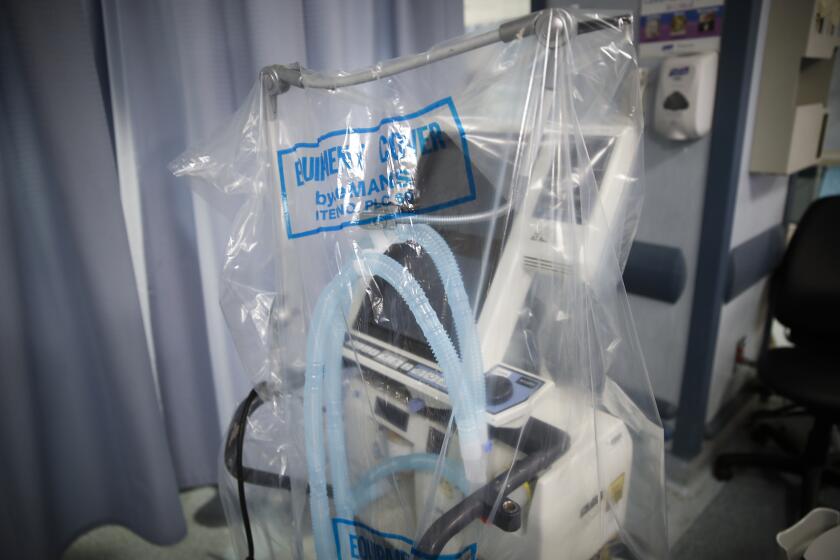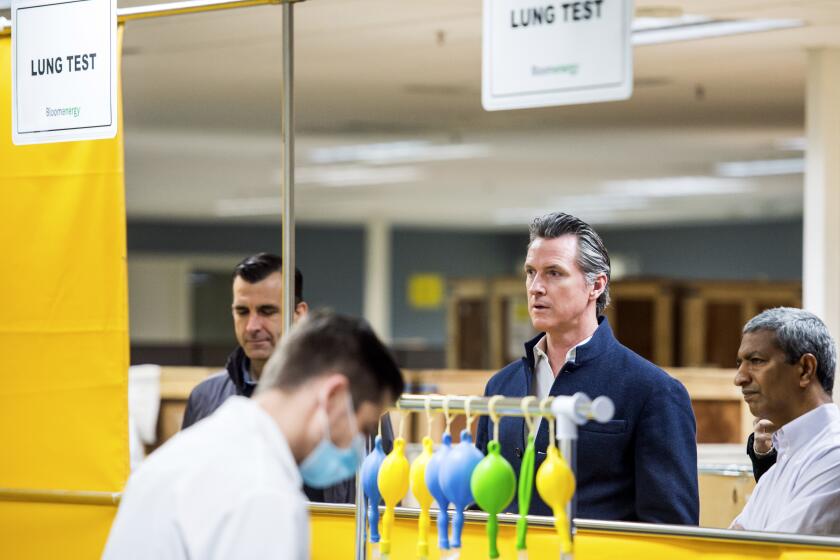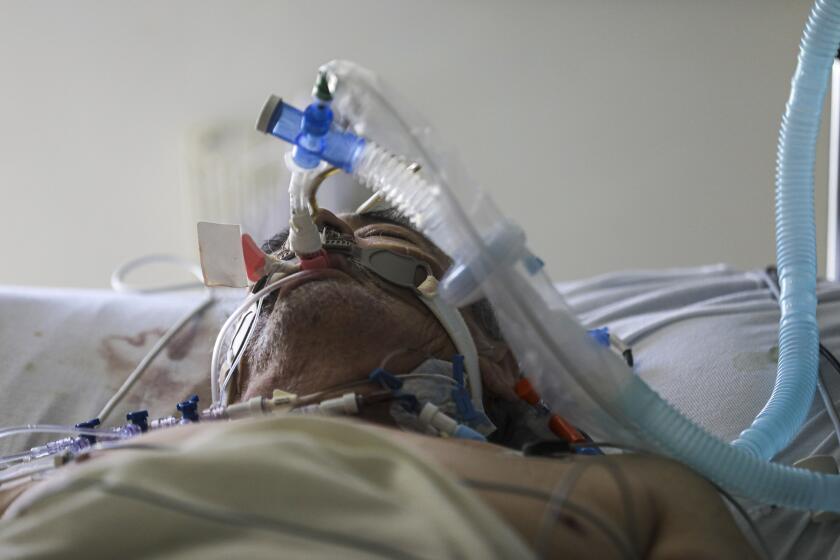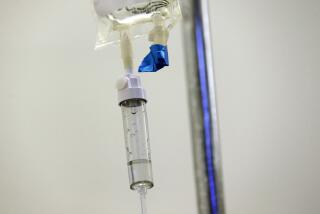Trump administration cancels ventilator orders, saying stockpile is full
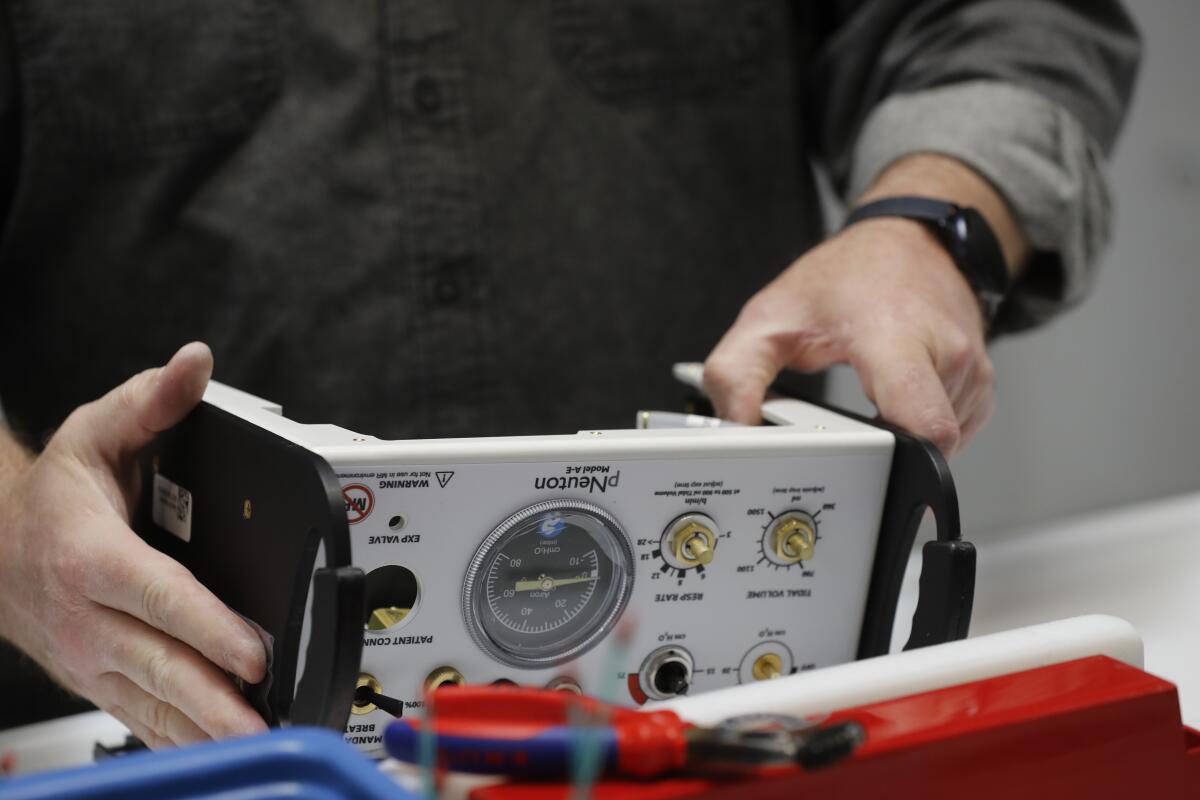
- Share via
WASHINGTON — The Trump administration is canceling some of its remaining orders for ventilators after having rushed to sign nearly $3 billion in emergency contracts as the COVID-19 pandemic surged in the spring.
The Department of Health and Human Services issued a statement Tuesday affirming that the national stockpile has now reached its maximum capacity for the life-saving breathing machines, with nearly 120,000 available for deployment to state and local health officials if needed. Though the orders were billed as a cost-saving measure, Democrats said the cancellations showed that the White House vastly overspent in its quest to fulfill President Trump’s pledge to make the U.S. the “king of ventilators.”
“By terminating the remainder of deliveries from these contracts, HHS is balancing federal stockpile requirements with commercial market demand for ventilators,” said Carol Danko, a spokesperson for the department. “As a result, HHS is saving the U.S. taxpayer millions of dollars by halting delivery of additional ventilators that are no longer required.”
The agency didn’t have an estimate for how much taxpayers would save by canceling the contracts because the terms and potential penalties for the early terminations were still being negotiated with the companies involved.
Health and Human Services confirmed that it was terminating contracts with ventilator manufacturers Hamilton Medical and Vyaire Medical, which will result in the cancellation of 38,000 ventilators that had been scheduled for delivery to the National Strategic Stockpile by the end of 2020.
The department declined to comment on the status of its largest ventilator contract, a massive $647-million deal with Philips that is now the subject of an internal HHS investigation and legal review.
In March, President Trump pledged 100,000 new ventilators in 100 days to address a shortage during the coronavirus crisis. A glut might result.
But Steve Klink, a spokesman for Philips at the company’s headquarters in Amsterdam, confirmed that its contract had also been canceled and that it would not deliver the 30,700 ventilators remaining on its order.
Klink said HHS had not yet given the company any “formal reason” for the cancellation.
“Unlike typically in the private sector, the U.S. government does not need any reason to terminate an agreement,” Klink said. “We can confidently say that we have delivered on our commitments. While we are disappointed in light of our massive efforts, we will work with HHS to effectuate the partial termination of this contract.”
The Philips contract has been under scrutiny because the company had signed a 2019 agreement to deliver 10,000 basic emergency ventilators to the national stockpile by 2022 at a cost of about $3,280 each. But once the COVID-19 pandemic hit, the company inked a new deal with the Trump administration to provide 43,000 of its more complicated and expensive hospital-grade models at an average cost of about $15,000 each.
Amid the coronavirus outbreak, Gov. Gavin Newsom said the U.S. government sent L.A. County broken ventilators, so a Silicon Valley company is fixing them.
The company has said it still plans to deliver the 10,000 low-cost ventilators over the next two years under its earlier contract.
House Democrats said they would expand their probe into the White House’s handling of the Philips contract, which they said was negotiated by Trump trade advisor Peter Navarro.
“American taxpayers deserve to have their money well-spent,” said Rep. Raja Krishnamoorthi, chairman of the House Subcommittee on Economic and Consumer Policy. “Incompetent negotiations by top Trump administration officials, like Peter Navarro, wasted hundreds of millions of taxpayer dollars.”
White House deputy press secretary Sarah Matthews said Navarro “played a vital role in our coronavirus response” by helping oversee federal contracts that helped create thousands of jobs.
Perhaps the stories of patients dying in agony from COVID-19 will get the mask refusers to abandon their denialism.
“While the Trump administration has been focused on saving lives, House Democrats continue to focus on pointless investigations,” Matthews said.
As the coronavirus began to spread widely across the U.S. in March, governors and mayors of big cities urged Trump to use his authority under the Defense Production Act to direct private companies to ramp up production of ventilators. At the time, the national stockpile had only about 16,660 ventilators ready to deploy.
Trump initially resisted calls to invoke the Korean War-era production act, but at the end of March he promised to deliver 100,000 new ventilators within 100 days. The president then tasked his son-in-law, White House advisor Jared Kushner, with leading the effort. During the month of April, HHS issued a flurry of emergency contracts to established ventilator companies, as well as to U.S. automakers Ford and General Motors.
But by the time the new machines were being delivered to the stockpile in the early summer, most doctors were moving away from the widespread use of ventilators for all but the most critically ill COVID-19 patients because of high death rates for those put on the machines.
The AP reported in May that the administration had issued contracts for delivery of nearly 200,000 ventilators by the end of 2020 — roughly twice what experts then predicted the country would need.
GM said Tuesday it has finished making all 30,000 ventilators under its $489-million contract. Ford announced earlier that it had finished making 50,000 ventilators for the government at a cost of $336 million.
More to Read
Sign up for Essential California
The most important California stories and recommendations in your inbox every morning.
You may occasionally receive promotional content from the Los Angeles Times.
